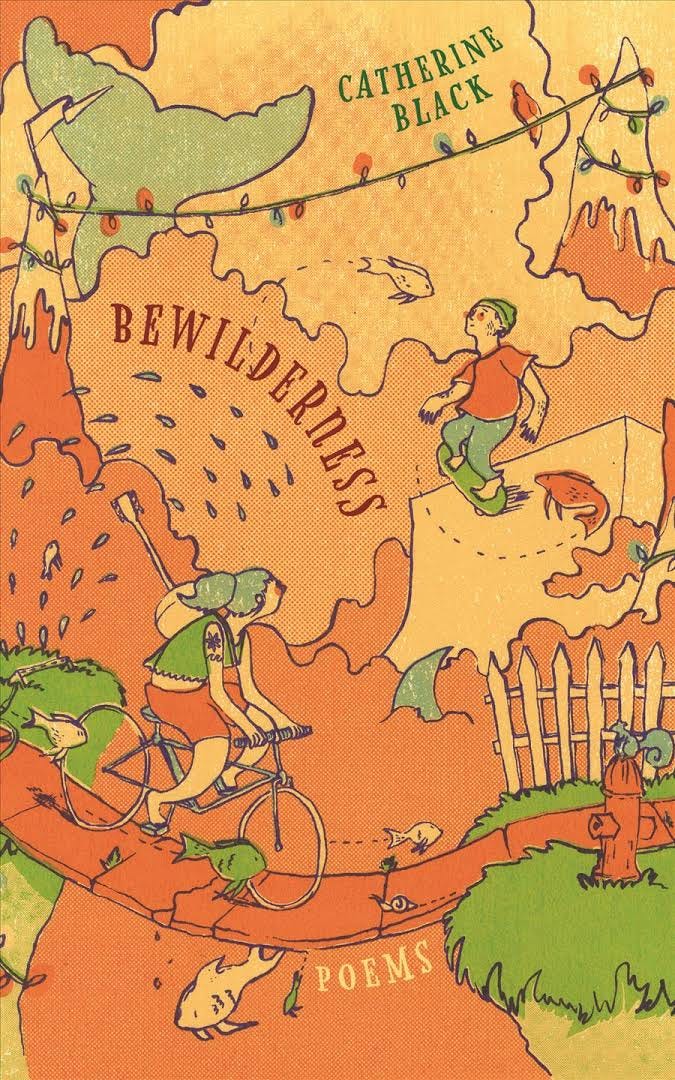
It takes a moment to realize that we’re living in the same world that Catherine Black describes in her newest poetry collection Bewilderness. It’s true, I don’t feel judged by the exasperated moon, who “is sick of taking all the blame for this, blood tides pulled to our surface as she scrapes round the solar system looking for an out,” as in “Moon-Minded,” or afraid of being judged, as the speaker in “Supermarket Liquor Store,” by “The bottles, amber, dragongreen, crystalline, [who] were prissy as hell […] were nose up and rude.” Yet there are moments in Bewilderness where it feels like Black has pulled back the curtain on another world that exists right next to this one. It wouldn’t take much to convince me, for instance, that “Mice don’t scream […but] have dainty lace doily conversations about edible things,” as the speaker in “Conversations in the Attic” claims; it is simply a matter of tuning in at the right moment.
Over the course of this playful collection of prose poems, Black encourages readers to open their eyes wider and have another look at the world around them the way nineteenth-century pastoral poetry sought to slow down time and emphasize the details that might get overlooked in the fast pace of modern life. Bewilderness updates this mandate for the twenty-first century as Black turns her gaze to the city, which has become a landscape in a category all its own. Here, Black’s observation of skyscrapers in “Bad Weather,” of how “Their good posture makes them look foolish to be out without umbrellas, all of them staring into the distance and never at each other,” combines the calming effect of paying close attention to details with the sheer comical nature of the situation. Bewilderness is filled with such moments and observations, and any time a line or entire poem makes you think that something isn’t possible, a doubtful voice somewhere in the back of your mind whispers: what if it is, and I just haven’t been looking attentively enough?
Humour is one of Black’s primary strategy in this collection, which she uses to discuss every-day routines and parts of the world we have begun taking for granted, especially nature. Black presents these parts of our lives from a new perspective to emphasize how desensitized we have become to places, things, and even people after constantly being around them on a regular basis. Poems like “Hummingbird Incarnation” and “Neurotic Creatures” gave me newfound appreciation for something as simple as sunlight, which, in “Broken Butterflies,” becomes “a different set of wings.”
Another frequented method in Bewilderness is to present things the perspective of nature and inanimate objects in such a way that humans become the extras rather than the other way around, once again injecting an element of ridiculousness into the situation. Water plays a prominent role in Black’s poems and is the subject of some of the most striking parts of the collection, such as the opening poem “This Is About the Forest,” where the speaker tells us “When the river is listening she’s a good listener, but otherwise she’s self-absorbed and goes on and on about herself.” In “Water Piece,” its role is much darker but simultaneously more human, as Black describes an event that is never fully identified but the nature of which is hinted at through the thoughts of a lake:
Only the lake knew for twelve hours, but didn’t know what to do about it. Who to tell. It was ashamed to be implicated, to be made the mute accomplice. The lake was sleeping when it happened. Trusting its dreams. Turning over at its dark premonitions.
This ambiguity is what I found so enjoyable about Bewilderness. Black’s prose poems are carefully crafted distortions of a familiar reality that has now been transformed into puzzles for the reader to figure out, although that is certainly not necessary. Still, that is how I approached poems like “At Auction,” while still others like “Contrapposto, Royal Ontario Museum” require a more open-minded and sensorial level of engagement itself. For me, Bewilderness fills a gap in contemporary literature that exists somewhere between razor-sharp reality and the swirls of the imaginary. It is a collection that operates using elements of both without committing to the strict rules of either, resulting in poems that feel endless no matter how much you think you’ve figured out what Black is trying to capture in them.
On ‘Bewilderness’ by Catherine Black was originally published in Anomaly on Medium, where people are continuing the conversation by highlighting and responding to this story.
